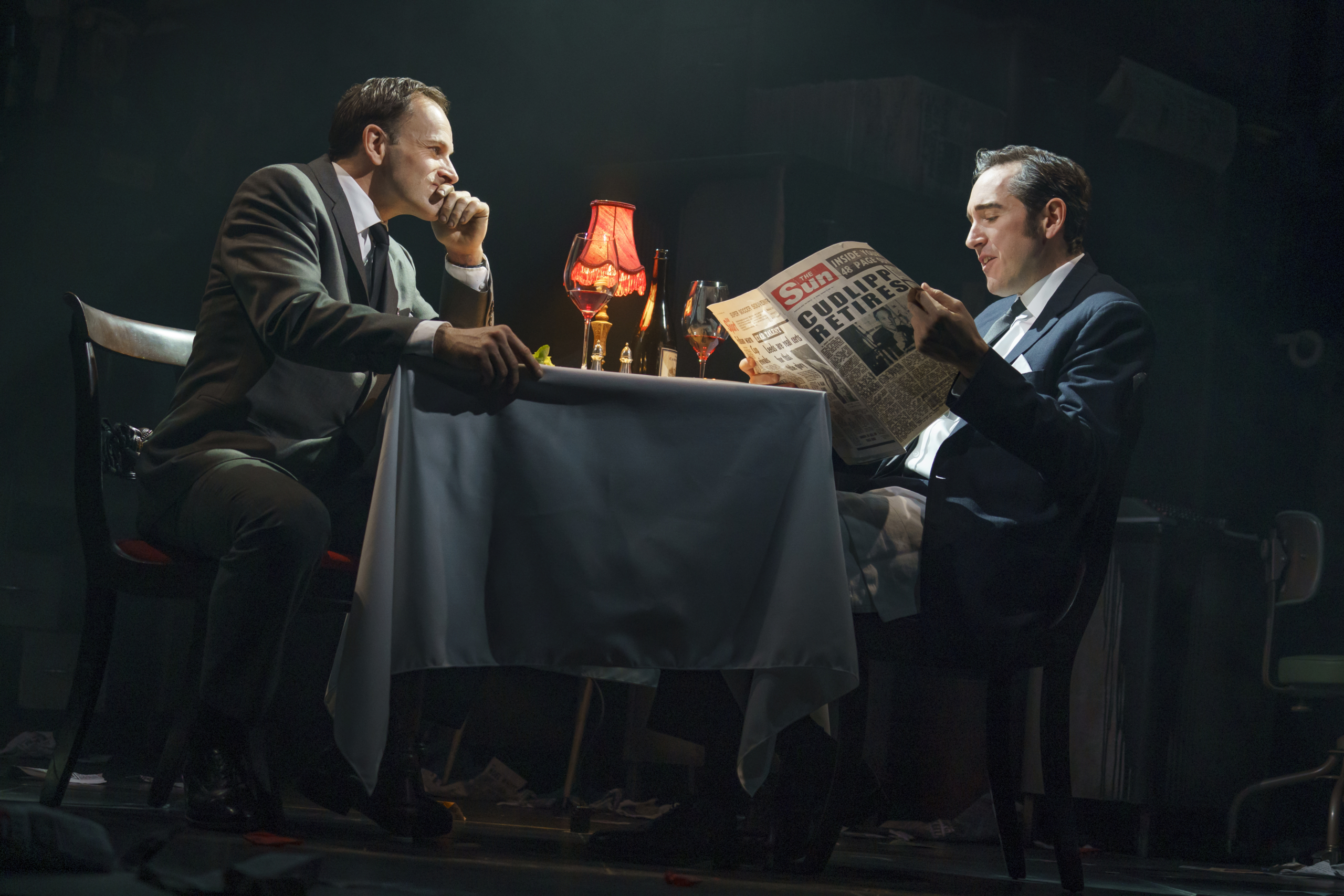Sign up for The Media Today, CJR’s daily newsletter.
On the night before Easter, in Manhattan’s Samuel J Friedman Theatre, a packed house gathered to witness the resurrection of The Sun.
That’s not idle wordplay. There’s more than a hint of the theological in James Graham’s Ink, about the Sun’s dramatic turnaround from failing broadsheet to popular tabloid in 1969-70. With its connotations of stains and permanence, the title alone hints at original sin.
Ink, which premiered in London in 2017 and officially opens today on Broadway, is not so much about Rupert Murdoch as the Rupert Murdoch Effect. Embodied by actor Bertie Carvel, Murdoch emerges as a god-like, if malformed, figure—one might say a Lucifer—who sets events in motion and appears at key moments thereafter to check in on what he’s wrought.
Before curtain at a recent preview performance, I talk to Marc Robinson, a Yale theatre professor who will discuss the play on a panel at the Invisible Dog Art Center in Brooklyn next month. Not being a knee-jerk, tabloid type, he predicts it will take him nearly that long to formulate a response. The young man next to me confesses he doesn’t know what the play is about; his friend’s friend is in the show. I tell him it’s an origin story of the guy who owns Fox News and the New York Post, among many others.
“So it’s about a monopoly of media,” he says, nodding. “This is going to be interesting.”
ICYMI: The Markup ousts editor in chief Julia Angwin, prompting resignations
We open on a prologue: a spectrally lit Murdoch and Larry Lamb (Jonny Lee Miller), the editor he’ll hire to carry out his will, discussing what makes a good story. (“‘Why’ I used to think was the most important [of the 5 Ws], now I think it’s the least. . . .Sometimes shit—just—happens,” is Lamb’s nihilistic take.) Despite foreboding lighting, the audience is quick to laugh at Murdoch’s brusqueness via Carvel’s adenoidal delivery.
As their exchange unfolds, so does the world of Fleet Street, expressed through a precarious tower of 1960s office desks, splattered with ink. Murdoch challenges Lamb to achieve the impossible: overtake the top-selling Mirror in one year. Having issued this de facto dare, he then pushes responsibility back to Lamb: “Make the paper you want. I trust you.” Eve’s serpent, acting on the advice of lawyers, could not have covered himself better.
Lamb’s efforts to build a staff are recreated in full Broadway style, with the theatrical version of a montage. A scene in which he and his deputy editor negotiate the degree of italicization to be used in headlines—“Did we lose the bloody war?! 80, best offer”—is tailor-made for the layout crowd, so oft neglected by comedy.
The whole first half is a “poppy, palatable take on how these elements that maybe didn’t seem so harmful at the time culminated in this empire,” Brian McGreevy, a screenwriter, reflects at intermission, comparing it to David Fincher’s film The Social Network. (Another recent writing credit of Graham’s: HBO’s Brexit, centered on a social media campaign that urged Britons to Vote Leave, just like The Sun did.)
The play’s second act is much darker; in it, projection looms large. There is the literal use of projection design to underscore themes: Ink spills like dark blood down the back of the set when the phone rings with horrifying news. Hundreds of identical images of newsprint scroll upward to create the illusion of a descent as Lamb and his paper—driven by an unholy mix of ambition, envy, and resentment—stoop low.
Murdoch flatters him, foments his class resentment until it makes him very ugly, then profits from that degradation while blaming Lamb for the worst outcomes. The seeds of his downfall, after all, were in him all along.
Then there are projections of the future. Lamb asks Diana, the horoscope writer, to make Murdoch’s forecast sunny. We the audience, meanwhile, project our secret knowledge onto the 50-year-old story. Graham invites us to do so with many lines, for example the words spoken by Hugh Cudlipp, the impossibly posh and equally sensible Mirror editor: “Pander to and promote the most base instincts of people all you like, fine, create an appetite, but I warn you. You’ll have to keep feeding it.” Each such presage draws a half-dozen knowing grunts from across the orchestra.
With hindsight, we can also project Lamb’s character arc onto a substantial swath of the human race. Murdoch flatters him, foments his class resentment until it makes him very ugly, then profits from that degradation while blaming Lamb for the worst outcomes. The seeds of his downfall, after all, were in him all along.
Perhaps most tragically, The Sun’s Hail-Mary gambit will end up being about projection in the Freudian sense. The ego needs little encouragement to throw its fears and failings onto other people. Eventually the commercial success of The Sun, and of Murdoch’s sprawling News Corp, will rely on providing that encouragement—a development hinted at in the final scene.
The most pleasurable moment of the night comes when Lamb, annoyed by Cudlipp’s professed love of Schubert, convenes his staff to ask: “What excites you, tickles you?” He rejects their initial answers, finally eliciting the taboo, the risqué, the id-driven. In the loose, giggly atmosphere created by well-scripted jokes and confessions, the audience warms up right along with The Sun.
“See this is my point,” Lamb cries, celebrating a feeling of connection. “A sense of humor. Giving normal folk the ammunition to laugh at their so-called betters. We punch up, never down. That should be our… ‘values.’ If that’s not too strong a word.”
Not too strong a word—unless it rests on the specious argument that the instinctual self is “the authentic self,” any more than any other version. Lamb and Murdoch’s valorization of so-called “normal people,” who consist only of their appetites, is bound to end grotesquely.
“Horrifying,” is Robinson’s verdict as we file out. “But amazing how they make you root for them at the beginning.”
New at CJR: ‘He’s not Cliff Huxtable’: Nicki Weisensee Egan on Chasing Cosby
Has America ever needed a media defender more than now? Help us by joining CJR today.








